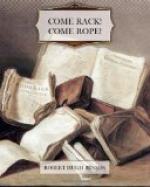His life was a strange and perilous one; he carried it in his hand every day. In the morning he could not be sure but that he would be fleeing before evening. As he fell asleep, he could not be sure that he would not be awakened to a new dream. He had long ago conquered those moods of terror which, in spite of his courage, had come down on him sometimes, in some lonely farm, perhaps, where flight would be impossible—or, in what was far more dangerous, in some crowded inn where every movement was known—these had passed, he thought, never to come back.
But in that little book-lined room, with these curious things in boxes on the table, and his merry host peering at him gravely, and the still evening outside; with the knowledge that to-morrow he was to ride back to his own country, whence he had fled for fear of his life, six weeks ago; leaving the security of this ex-sheriff’s house for the perils of the Peak and all that suspected region from which even now, probably, the pursuit had not altogether died away—here a sudden intense desire to know what the future might hold overcame him.
“Tell me, sir,” he said. “You have told Mr. FitzHerbert’s fortune, you say, as well as others. Have you told mine since I have been here?”
There was a moment’s silence. Mr. John was silent, with his back turned. Robin looked up at his host, wondering why he did not answer. Then Mr. Bassett took up the candle.
“Come,” he said; “we have been here long enough.”
CHAPTER III
I
“There will be a company of us to-night,” said Mr. John to the two priests, as he helped them to dismount. “Mr. Alban has sent his man forward from Derby to say that he will be here before night.”
“Mr. Ludlam and I are together for once,” said Mr. Garlick. “We must separate again to-morrow, he is for the north again, he tells me. There has been no more trouble?”
“Not a word of it. They were beaten last time and will not try again, I think, for the present. You heard of the attempt at Candlemas, then?”
* * * * *
It had been a quiet time enough ever since Lent, throughout the whole county; and it seemed as if the heat of the assault had cooled for want of success. Plainly a great deal had been staked upon the attack on Padley, which, for its remoteness from towns, was known to be a meeting-place where priests could always find harbourage. And, indeed, it was time that the Catholics should have a little breathing space. Things had been very bad with them—the arrest of Mr. Simpson, and, still more, his weakness (though he had not as yet actually fulfilled his promise of going to church, and was still detained in gaol); the growing lukewarmness of families that seldom saw a priest; the blows struck at the FitzHerbert family; and, above all, the defection of Mr. Thomas—all




